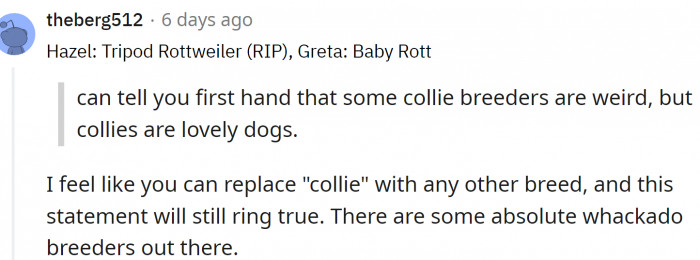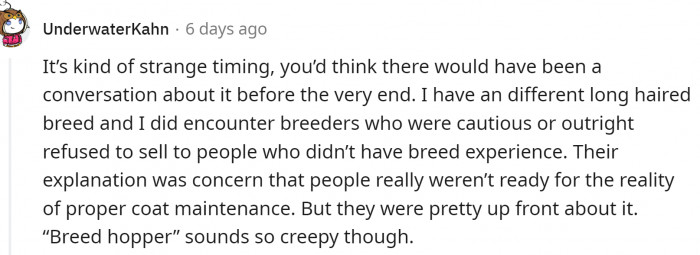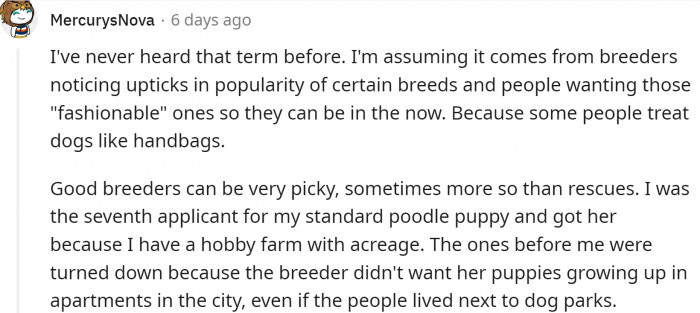Is "Breed Hopping" A Thing? Reddit Knows The Answer
People love dogs. Most dog owners would do anything to protect their pets.
However, some may go a bit too far. We have an interesting story today. One Redditor asked if breed hopping is a thing.
He was in contact with a dog breeder about a Border Collie puppy, and everything was going well. They had several pleasant chats, filled out a couple of questionnaires, and were supposed to meet the puppy in person to play with it and see if they were a good fit.
However, the breeder suddenly decided to cancel. The explanation was that the original poster (OP) is a “breed hopper.”
Now, OP asks the Reddit crowd if that is actually a thing. The post can be a good source of information for people looking to buy a puppy, and we suggest you read it.
Redditors shared many interesting responses that provided insight into the way some breeders think. Although denying a person the possibility of buying a puppy simply because they have owned different breeds before may seem a bit harsh, there is an explanation for that.
As always, responsible dog lovers are suffering because of individuals who view dogs as fashion accessories.
One Redditor asked:

And shared their story:

They found a breed they wanted, contacted a breeder, had chats, filled out questionnaires... And then, one day before the scheduled meeting in person, the breeder told them that it was not going to happen.

The Psychology Behind Breed Preferences
Understanding why some breeders refuse to sell to individuals who have owned different breeds can be tied to psychological concepts of attachment and identity. According to a study published in the Journal of Veterinary Behavior, pet ownership is often linked to a person's self-concept and emotional well-being. Individuals may develop strong attachments to specific breeds based on their experiences, forming a unique bond that shapes their identity as pet owners.
This attachment may lead breeders to believe that individuals who have switched breeds lack the commitment or understanding necessary for responsible ownership. Such perceptions can be viewed through the lens of social identity theory, which posits that people derive a sense of self from their group memberships—in this case, the breed they identify with.
Understanding the motivations behind breed hopping can also have implications for therapy and mental health practices. According to Dr. Kelly Brogan, a holistic psychiatrist, "Pets can serve as a powerful source of emotional support, helping individuals navigate anxiety and depression." This sentiment is echoed by Dr. Terri Orbuch, a relationship researcher, who states, "Exploring our connections with pets can reveal much about our emotional needs and attachment styles." By fostering these connections, individuals may gain a clearer understanding of their emotional landscape, allowing for more effective coping strategies in their daily lives.
The breeder deemed OP as a "breed hopper" and refused to sell them a puppy.

Redditors say that some collie breeders are... a bit peculiar.

But that goes for many dog breeders.

In the world of dog breeding, the concept of 'breed hopping' reflects deeper psychological principles regarding loyalty and commitment. Research by Dr. David K. L. Lee, a sociologist at Yale University, highlights that individuals often seek consistency in their choices to establish a coherent identity. His findings suggest that when people frequently switch between different dog breeds, it can be perceived as a lack of commitment, which may raise concerns among breeders about the owner's ability to provide stable care.
Moreover, this behavior may indicate a broader trend in consumer psychology, where instant gratification and novelty-seeking lead individuals away from long-term relationships. Understanding this tendency can help breeders and dog owners alike foster a more supportive environment that encourages responsible ownership.
Collie owners say:

That's new information for us all.

Breed-hopper police:)

Attachment Styles and Pet Ownership
Attachment theory provides a compelling framework for understanding the emotional dynamics between dog owners and their pets. According to Dr. Daniel Gilbert, a happiness researcher, "Our relationships with pets can mirror our relationships with people, often reflecting our attachment styles." Studies indicate that individuals with secure attachment styles are more likely to form strong, stable bonds with their pets, while those with insecure attachments may experience more ambivalence in their relationships with animals. A review of psychological literature highlights that these attachment styles can influence not only how individuals interact with their pets but also how they perceive their responsibilities as owners. For breeders, recognizing these differences in attachment can be beneficial. They might consider implementing screening processes that assess potential owners' attachment styles, thus matching them with breeds that are more aligned with their emotional needs and capacities. This approach can enhance compatibility and long-term satisfaction for both the owner and the dog.
One Redditor said: “I've never heard that term before. I'm assuming it comes from breeders noticing upticks in the popularity of certain breeds and people wanting those 'fashionable' ones so they can be in the now. Because some people treat dogs like handbags.”
This is so sad and infuriating.
Dog resume gap:)

OP is, understandably, very angry and confused.

Some breeders do screen their buyers.

Social perceptions around breed hopping can also be shaped by cultural narratives about dog ownership. Research in the field of cultural psychology suggests that societal norms and values heavily influence how individuals view their responsibilities towards pets. For instance, Dr. Emily H. Johnson from the University of Michigan points out that in cultures where pets are seen as family members, individuals are more likely to commit to a single breed due to the emotional investment involved.
Breeders can leverage this understanding by fostering community discussions about the deeper emotional significance of breed ownership. Workshops that emphasize the importance of commitment and understanding in pet ownership could provide valuable insights and foster a sense of community among dog owners.
And apparently, our OP didn't pass the test.

But you can learn these things.

But the breeders just want what's best for the puppies.

Practical Recommendations for Breeders
To address the concerns surrounding breed hopping, breeders can adopt a more educational approach in their interactions with potential buyers. Providing resources about the unique needs and characteristics of different breeds can help prospective owners make informed decisions that align with their lifestyle and emotional capacity. Dr. Lisa T. Marshall, a licensed psychologist, emphasizes the importance of equipping individuals with knowledge as a means of fostering responsible pet ownership.
Additionally, creating a mentorship program where experienced pet owners can guide new owners could bridge the gap between different breed experiences. This not only supports responsible ownership but also builds a community of informed pet lovers, ultimately benefiting the well-being of the dogs involved.
Many people out there just want that dog their kids saw on TV.

We have to say that we appreciate the way some dog breeders screen potential buyers. They are simply looking after their puppies and ensuring they find the best home.
After all, pet shelters are doing it, so why not breeders too? Most of them are not in it just for the money—they truly care about their dogs.
And that’s commendable. However, refusing to sell to a person who simply had different breeds in the past seems a bit too harsh.
Some people stick to one breed their whole lives, but others want to share their love with as many dogs as possible. And they should.
Psychological Analysis
The concept of "breed hopping" really highlights how our attachments to pets can shape our identities and social perceptions. When breeders refuse to sell to individuals who switch breeds, it often stems from a belief that these people lack commitment, reflecting deeper psychological needs for stability and belonging. It’s interesting how cultural narratives can influence our choices and relationships with pets, suggesting that fostering a sense of community around responsible ownership might help bridge these gaps.
Analysis generated by AI
Behavioral Analysis & Pathways Forward
In summary, the phenomenon of breed hopping touches on intricate psychological themes, including attachment styles, identity, and social perceptions. As research underscores, the emotional bond between pet owners and their dogs is pivotal for the well-being of both parties. With insights from psychology, breeders and potential pet owners can create a more informed and supportive environment that promotes responsible ownership and emotional fulfillment.
By recognizing the diverse motivations behind pet ownership and addressing them through education and community support, we can foster healthier relationships that benefit both dogs and their humans.



